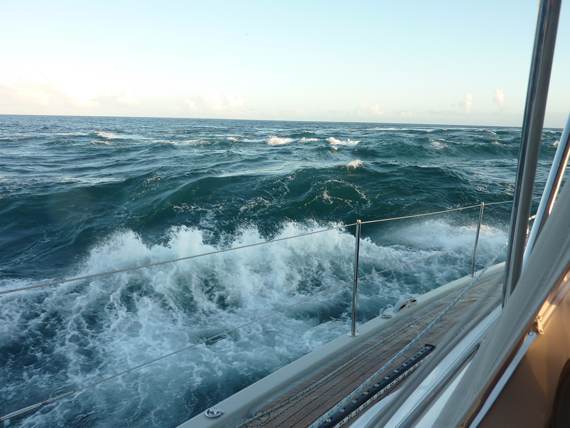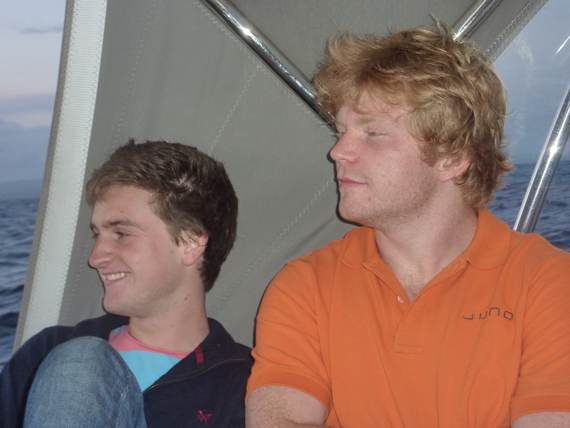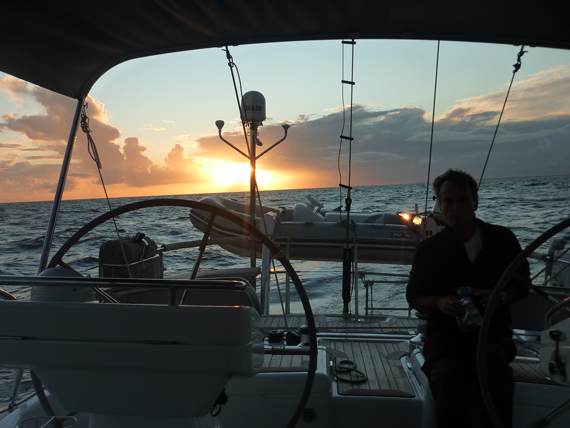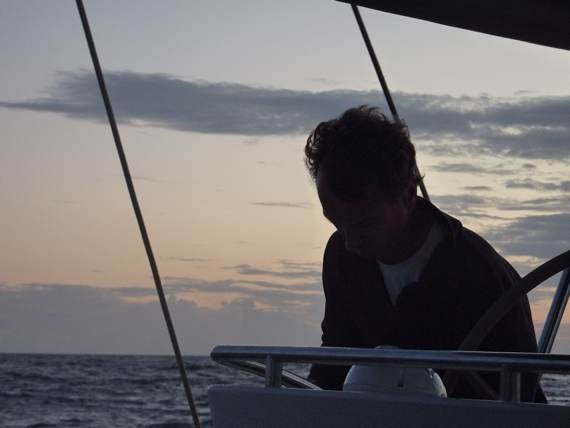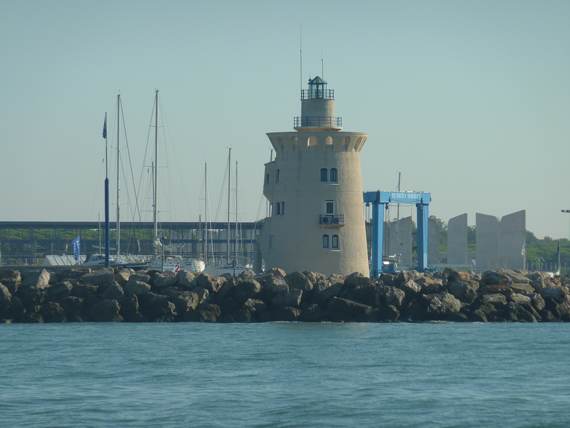High Drama at Cadiz

Juno
Paul and Caroline Frew
Sat 3 Sep 2011 19:16
I am sitting at the cockpit under the shade of the bimini. The fishing rod
is in its holder on the transom, its bright yellow 80 lb line stretched
taught from the pull of the lure. An air of anticipation pervades the aft
deck as I study the line, waiting for the first signs of a take from a big
fish. We are on the edge of the 30 metre contour line with deep blue water
on our starboard side and bright aquamarine sea to port, only 8 metres deep
and perfect conditions for tuna fishing. All very Hemmingway - other than
the fish. The lure is the latest in a long line of different baits, all
'very good senor', all reassuringly expensive and all sharing one common
trait; they have failed to attract even the smallest bite. Actually i am
embarrassed to report that i did actually hook a seagull off the coast of
Portugal so if on your next holiday on the Algarve you see a large brown
bird with a bright red lure attached to its left claw then please see if you
can retrieve lure number 23.
Today is all very different from last night. We left Ilha da Culatra on the
ebb tide at 7 in the evening with the prospect of a gentle night sail to
Cadiz, however little did we know that we would have a night of high drama.
It all started as we motored towards the exit from the lagoon. A northerly
wind had been blowing all day and as the tide was ebbing south out of the
lagoon the two forces of wind and tide acting against each other had created
what sailors call over falls. To the layman this is better described as
large breaking waves moving in all directions in an apparent state of chaos,
interspersed with swirling whirlpools which appear to be boiling on the
surface of the sea. With cameras at the ready and everybody braced for the
ride, we entered the rollercoaster and Junos bows immediately ploughed into
the first big wave engulfing the foredeck and sending a huge shower of
seawater against the cockpit spray hood. After an impossible length of time
her bows rose again and surged forward as the next wave picked us up and
slammed the bows down into the following trough. To make matters more
interesting, we were mid way between the two breakwaters with rocks only 25
metres either side of us. Thanks to Juno's big engine we powered our way
through the maelstrom and after a scary ten minute ride we were out into the
relative calm of the ocean.
After dinner we settled the boat down for the night, with Caroline and Jamie
doing first watch until midnight, Tom and Mat to 3am and me from 3am until
dawn. After making sure that everything was secure for the night i went
below to my cabin to get some sleep. A gentle wind from the south west was
on our beam, giving us 7 knots of boat speed which would make for landfall
around dawn. Around 10.30 i was awoken by the sound of the engine starting
and I went up on deck to make sure all was well. Boat speed had dropped to 4
knots and Caroline had started the engine to bring our speed back to around
7 knots. However, after only a few minutes a strong smell of burning was
drifting up to the cockpit. I turned the engine off and dived down the
companionway, pulling poor Mat out of his bunk which is next to the engine
room. Opening the engine room doors i was horrified to see the engine
shrouded in thick smoke and an acrid smell of burning filled the entire
boat. Next, the fire alarm went off, giving the situation an increased sense
of urgency and drama as i tried to reason what had happened and what to do
next. By this time the crew were all on deck and with no wind and no engine
Juno was starting to roll in the Atlantic swell. At first i assumed that the
over falls had allowed air into the sea water intake and that the engine had
overheated so i went below to bleed the water intakes. However none of the
overheating alarms had gone off and this didn't explain the burning smell.
Tom and i talked though the symptoms trying to diagnose the problem and we
concluded that one of the sea water intakes had lost its prime and that the
rubber impellor that pumps the water had melted through lack of lubrication.
My frequent trips down below in the rolling sea combined with the fumes from
the engine room made me and Mat feel very seasick, but thanks to the wonders
of Stugeron pills, the rest of the crew were fine. By switching on the
engine room fans, the smoke had cleared a little but there were no visible
signs of anything else that could be causing the problem - this in itself
faintly reassuring. The wind started to pick up again and we resumed our
voyage and by 6am Caroline joined me on deck allowing me to sleep for an
hour before making our landfall.
I awoke Tom at 8am to explain the plan. Not knowing if our engine would
start we had to plan to either dock under sail or anchor off in Cadiz
harbour and try and make repairs. I decided that we would enter under sail
with the anchor ready to deploy if necessary - all quite a challenging
prospect in a 58 foot yacht. The wind was blowing gently from the west so we
set a small headsail and furled away the mainsail. We also decided that we
would use the engine when we were just off the dock, which i would use in
reverse to slow ourselves down as we approached the pontoon. We called the
Marina and advised them of our situation and they sent two 'marineros' down
to the reception pontoon to help. Fifty metres from the dock, with heart in
mouth, i pressed the engine start button and immediately Juno responded with
the quiet rumble of her Cummins engine - so far so good. As we rounded up
into the wind and neared the pontoon, Tom and Caroline threw our lines to
the waiting marineros, a touch of reverse to slow our speed and we had
docked - phew! Next, a swarthy man dressed in smart white shorts and
matching shirt held out his hand towards me and said 'I am the harbour
master, welcome to Puerto Sherry'. He then wrinkled his nose as he sampled
the noxious fumes surrounding our boat and continued 'if you need anything
we are 'ere to'elp'. We had arrived in Spain.
When the engineer arrived from Cadiz, he took one look at the engine and
said 'alternator no funciona' - even in my schoolboy Spanish I could
understand that one of our alternators had burnt out and simply by
disconnecting it the smell of burning stopped. It was a relief to know that
it was nothing very serious and later in the day Oyster rang to confirm that
they would replace it under warranty and have it shipped to Palma to be
fitted.
Tomorrow Gibralter.
Paul Frew
J U N O
m: +44 7798 665 333
